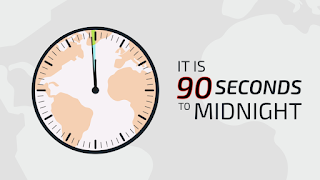Being
born in the decade following the bombings of Hiroshima and
Nagasaki, my entire conscious life I have lived in fear of nuclear war.
Fear is a healthful response to danger. It's what keeps animals
alive. It allows species, including humans, to survive. Unfortunately, we humans have always been a suicidal species. Since we discovered that just two atom bombs were enough to kill 300,000 of our fellow humans, Russia and the
USA (not to mention China, France, the UK, North Korea, Israel, India,
and Pakistan) have stockpiled enough nuclear weaponry to destroy the planet
multiple times over. Fear of MAD (mutually assured destruction) has
allowed
the planet to survive for over seventy years. However, in recent months our enlightened leaders have been displaying signs of great courage and the world has been celebrating their valour. All this unbridled, suicidal bravery is truly frightening.
In elementary school we were told that in the event of a nuclear attack we should crouch under our desks. By the age of eight or nine, we were cynical enough to add to the instructions: "place your head between your legs and kiss your ass goodbye."
I was ten years old during the Cuban missile crisis. I still remember the day the local alarm sounded announcing incoming nuclear missiles. Before word came down that it was just a test, I had time to think about what to do when the world was about to end. I realized then and I remember now when (to quote Waiting for Godot) "there is nothing to be done," you become deadly calm.
In recent days, people in positions of privilege and
power talking fearlessly about nuclear war has become commonplace. In fact,
we are explicitly told it is a mistake to fear Vladimir Putin and his
threats of nuclear war. To those many advocates of escalation telling us that Russia must be defeated, I have one question: How do you know Vladimir Putin will not use the Russian nuclear arsenal?
Perusing the narratives against a negotiated peace and the Minsk Accords in search of an answer to this question, I can't see any credible logic in the responses. "Putin is bluffing" simply means that he will continue to bluff until he is forced to act. "The American response will be dire." What could the Americans do, that they aren't doing now? Are we threatening the Russians with a nuclear holocaust? Does anyone believe that if Russia is attacked with conventional forces, the Russians will restrain from a nuclear response?
The Bulletin of the Atomic Scientists has re-set the "Doomsday Clock" to 90 seconds before midnight--a level of "unprecedented danger," the closest to midnight it has ever been. Bookies at Polymarket are offering 20-to-1 odds on Russia using nuclear weapons in 2023.
The bravura I see everywhere these days reminds me of General Thomas Power, commander in chief of the US Air Command, who infamously responded to the threat of nuclear war saying "At the end of the war if there are two Americans and one Russian left alive, we win!"
As we stand before the precipice, the big news in Canada and the USA is that American "Top Guns" shot down some Chinese balloons. Balloons for gawd sake! Who could've imagined that Nena's 1980s satiric pop song, "99 Red Balloons," would end up sounding like it was written in February 2023?











From Rand.org "Avoiding a Long War": Western governments appear to have become convinced that Moscow considered using nonstrategic nuclear weapons (NSNW) as its forces lost ground in the fall. Russia has denied these allegations, but news reports suggest that top Russian commanders did discuss this option.[6]
ReplyDeleteSome analysts have dismissed the possibility of NSNW use, contending that Russia knows that employment of nuclear weapons would be self-defeating. They point to the lack of high-value military targets (for example, concentrated Ukrainian forces) that could be effectively destroyed with such weapons and to the risk that these weapons might harm Russian troops deployed in Ukraine. Use of these weapons could provoke NATO's entry into the war, erode Russia's remaining international support, and spark domestic political backlash for the Kremlin. Knowing this, the logic goes, Russia would be deterred from using nuclear weapons.[7]
These arguments ignore several issues that make Russian use of nuclear weapons both a plausible contingency that Washington needs to account for and a hugely important factor in determining the future trajectory of the conflict. First, there is evidence that the Kremlin perceives this war to be near existential.